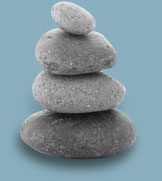Reconciliation Meditation: Instruction | Meditation
Instructions for Reconciliation Meditation
As taught by Phillip Moffitt
The purpose of the Reconciliation Meditation is to provide a means for yogis to work with loving kindness and forgiveness in a form of meditation that is inclusive and non-clinging. It incorporates the idea that through non-attachment, one is able to achieve a peace or reconciliation with another without there being a resolve of all issues. Through reconciliation practice, a peace evolves even in the midst of outstanding disagreements from the past or even the present. Two inspiring examples of reconciliation in everyday life are the Truth and Reconciliation Commission (TRC) in South Africa and the Dalai Lama's treatment of the Chinese as "my friends, the enemy."
Begin the practice by saying the first line to yourself in a slow measured fashion. As you repeat the line, picture in your imagination a feeling of acceptance between a father and daughter where the differences, rather than being ignored or arising as a subject of tension, are included in a feeling of connection. Follow this same procedure with each line, it is to be expected that some phrases will resonate more for you than will others.
The Buddha taught that all human beings are connected through the common desire to be happy. No matter how unskillful a person's behavior, coming from greed, hatred or delusion, that behavior is motivated by a search for finding happiness. Reconciliation practice recognizes the necessity of connection and the interdependency among all human beings. This practice can show the way to an end of clinging and suffering by acknowledging the underlying commonality, the need for inclusion, and the undeniable truth of differences.
In doing this practice you are not denying or ignoring the existence of past wrongful behavior, nor are you forsaking the hope that more skillful, behavior will arise in the future. Your aspiration is that you, your family, and friends, and members of the greater community will experience an underlying reconciliation that reflects the truth of interdependency and the truth of non-separateness. You may say each line for as long as you like, initially about one minute or twelve to fifteen times per line.
If you are a teacher leading this practice, introduce the practice with a short explanation: be careful to explain that it is not condoning unskillful behavior. Begin with saying each line once, pausing for each yogi to repeat silently then repeat once or twice more. Usually saying less is better than saying more, and it is important that you maintain a steady rhythm between phrases. It is not unusual for someone to initially dislike the practice and then become very enamored of it. With the family part, it is helpful to picture someone within your family or someone you know, or to imagine someone in the sitting group.
The practice can be done with only the family part ending with, "may mothers and fathers be reconciled." It is also possible to choose only one line or just a few lines and repeat them over and over. Because the practice builds strong concentration, it is desirable to leave at least a few minutes at the end of the practice for regular vipassana practice. Tears often arise; and if you are teaching the practice, you should acknowledge this as a welcome possibility in your beginning introduction.
We welcome your feedback from utilizing this practice.
Reconciliation Meditation
(Family only Version)
May all fathers and daughters be reconciled.
May all mothers and sons be reconciled.
May all mothers and daughters be reconciled.
May all fathers and sons be reconciled.
May all brothers and sisters, sisters and sisters, and brothers and brothers be reconciled.
May all mothers and fathers be reconciled.
May all husbands and wives, lovers and partners be reconciled.
(Dedication of merit at the end)
May the merit of this practice be to the liberation of all beings.
(Expanded Version)
May all fathers and daughters be reconciled.
May all mothers and sons be reconciled.
May all mothers and daughters be reconciled.
May all fathers and sons be reconciled.
May all brothers and sisters, sisters and sisters, and brothers and brothers be reconciled.
May all mothers and fathers be reconciled.
May all husbands and wives, lovers and partners be reconciled.
May all friends and enemies be reconciled.
May all teachers and students be reconciled.
May all communities and their members be reconciled.
May all countries and their citizens be reconciled.
May all warring nations be reconciled.
May all races and religions be reconciled.
May all people everywhere be reconciled.
May all people and this Earth be reconciled.
(Dedication of merit at the end)
May the merit of this practice be to the liberation of all beings.





